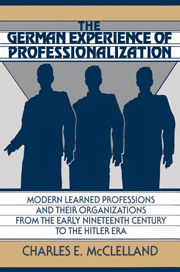 The German Experience of Professionalization
The German Experience of Professionalization Book contents
- Frontmatter
- Contents
- Acknowledgments
- Abbreviations
- Part I The problem of professions in Germany
- 1 Introduction
- 2 Problems and methods in the history of modern German professions
- Part II The transition to modern professions in the early nineteenth century
- Part III Unified professions in a unified Germany?
- Part IV Breakthroughs and breakdowns: The professions enter the era of cartels and unions
- Part V The Weimar era
- Part VI The fate of professions under and after fascism
- A word about sources
- Index
2 - Problems and methods in the history of modern German professions
Published online by Cambridge University Press: 06 July 2010
- Frontmatter
- Contents
- Acknowledgments
- Abbreviations
- Part I The problem of professions in Germany
- 1 Introduction
- 2 Problems and methods in the history of modern German professions
- Part II The transition to modern professions in the early nineteenth century
- Part III Unified professions in a unified Germany?
- Part IV Breakthroughs and breakdowns: The professions enter the era of cartels and unions
- Part V The Weimar era
- Part VI The fate of professions under and after fascism
- A word about sources
- Index
Summary
Social scientists and social historians have been aware of the importance of professions for some time, at least in the English-speaking world. Some of the earliest serious studies date back to the period between the world wars. Not coincidentally, academic interest in the professions followed closely on the heels of the rise to prominence and influence of such professional bodies as the American and British Medical Associations and a parallel emergence of “professionalization” of more and more occupations.
For reasons intrinsic to both modern society and sociology, furthermore, professions have come to be more and more prominent objects of social-scientific study. As one observer recently put it:
How expert knowledge is deployed in different institutional forms, how it is controlled, how it is used as a resource of power and a basis of privilege, and how in turn different institutional forms of deployment, social control as well as collective and individual advantage, are affected by other and wider social structures and processes – inquiries into these questions tell us much about the structure and the dynamics of society as a whole. That, furthermore, the subject is closely related to a – perhaps the – central theme of classical sociology, the emergence of modern society and culture, becomes clear once we identify increased rationality in the pursuit of pragmatic goals as one of the major characteristics of that process.
Although Max Weber had little directly to say about professionalization or the Berufsstände organizing in Germany during his lifetime, he did point to the rationalization of life and the demystification of the world as signs of modernization.
- Type
- Chapter
- Information
- The German Experience of ProfessionalizationModern Learned Professions and their Organizations from the Early Nineteenth Century to the Hitler Era, pp. 11 - 28Publisher: Cambridge University PressPrint publication year: 1991
